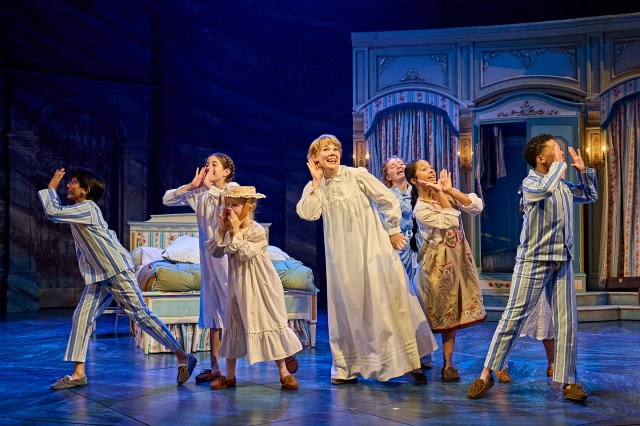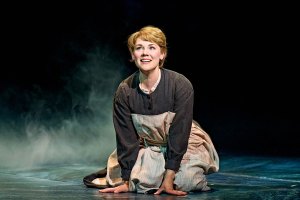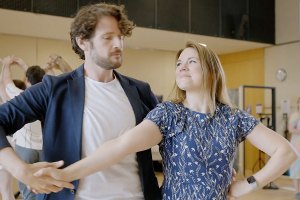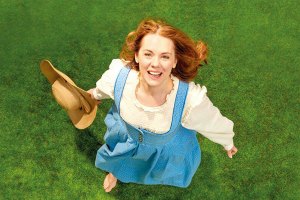The Sound of Music at Chichester Festival Theatre – review
Adam Penford’s revival continues through to 3 September

Familiarity breeds contempt – it’s easy to dismiss The Sound of Music as a has-been of the musical theatre canon, but then you hear the score and realise that it still contains some of the most sumptuous sounding songs of a generation. Is there really a more rousing finale to any musical than that of the Mother Abbess belting out “Climb Every Mountain”? It’s a chills-down-the-spine moment in Adam Penford’s otherwise solidly predictable revival at Chichester Festival Theatre.
The Sound of Music was Rodgers and Hammerstein’s final collaboration before the untimely death of Hammerstein, just nine months after its Broadway premiere. But whilst the score is a sugary yet stirring hit, the book by Howard Lindsay and Russel Crouse is often as stodgy as a soggy strudel, and sadly Penford succumbs to the pacing dips that result in it being an uphill struggle at times to get to that final mountain.
Gareth Valentine has worked his musical magic and created some gorgeous reworkings of the score and some particularly nice extended orchestrations that are played divinely by Matt Samer and his off-stage orchestra. Glorious also is the spellbinding choral work provided by an elite ensemble of nuns that utterly beguile with each appearance. Alongside the mighty voice of Janis Kelly as Mother Abbess they punctuate proceedings with enchanting moments of spirituality.
Gina Beck is back at Chichester (she was Nellie Forbush in the 2021 hit and subsequent tour of South Pacific) as Maria. Beck positively sparkles with a tomboy-ish charm and a maternal warmth as the woman that turns the Von Trapp family on its head. Her voice soars with a tender yet feisty edge – her yodelling skills are also quite something! The third of the trio of leading ladies is Emma Williams as Frau Schraeder. Williams brings an assured level of maturity to the ‘other woman’ yet manages not to demonise her completely. Her desertion of Von Trapp is done with such no-nonsense certainty that it is all the more hurtful. Williams is a commanding presence on stage at every turn.
The men of the piece are sadly less successful. Edward Harrison is a solid enough Captain Von Trapp, although he lacks the gravitas of such a powerful man and fails to ignite the chemistry between him and Beck’s Maria. His vibrato voice doesn’t always sit easily with his musical numbers but is still enjoyable, nonetheless. As Max, Ako Mitchell doesn’t quite manage the charisma needed for the slippery man that is happy to settle on whichever side is to be the winning one.
The often two-dimensional troupe of Von Trapp children are given added weight and become a wonderfully drilled array of individual characters. Rather than sickly sweet stage dressing, this gang are genuinely engaging and help to drive the narrative. Led by Lauren Conroy as Liesl, a confident and comic set of Von Trapps are the standouts whenever they’re onstage (Dylan Trigger – Friedrich, Sasha Watson-Lobo – Louisa, Vishal Soni – Kurt, Audrey Kattan – Brigitta, Maya Sewrey – Marta, and Felicity Walton – Gretl).
Robert Jones has created an imposing stage design of dark and dominating rock. The Abbey is carved into the bedrock of the hills that are allegedly alive with the sound of music, but actually just loom large and intimidating over proceedings with just a few feet of skyline ever visible at the very top of it. It makes for a claustrophobic feel, even in the moments that ought to be light and airy.
Nazi banners fall into place for the final scenes, but until that moment there is little evidence of the impending terror that is to come. Blurred projections of marching stormtroopers announce their arrival but are squeezed up into that little bit of sky that shows above the rock face set and provides only limited impact.
It’s good, hearty, traditional stuff. Beck is brilliant, Kelly is superb, the kids are awesome. The score is a classic, but the book remains a problem – and is one that, like Maria, has yet to be solved.















